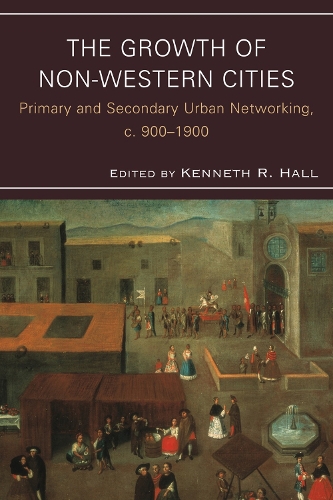
The Growth of Non-Western Cities: Primary and Secondary Urban Networking, c. 9001900
(Paperback)
Publishing Details
The Growth of Non-Western Cities: Primary and Secondary Urban Networking, c. 9001900
By (Author) Kenneth R. Hall
Contributions by Christopher Agnew
Contributions by Michael H. Chiang
Contributions by Hugh Clark
Contributions by Marc Jason Gilbert
Contributions by Elizabeth Lambourn
Contributions by Peter Mentzel
Contributions by Stephen Morillo
Contributions by Hyunhee Park
Contributions by Jay Spaulding
Bloomsbury Publishing PLC
Lexington Books
8th August 2011
United States
Classifications
Professional and Scholarly
Non Fiction
General and world history
Regional / International studies
307.76
Physical Properties
Paperback
358
Width 157mm, Height 232mm, Spine 21mm
576g
Description
These interdisciplinary studies address pre-1900 non-Western urban growth in the African Sudan, Mexico, the Ottoman Middle East, and South, Southeast, and East Asia. Therein, primary and secondary cities served as functional societal agents that were viable and potentially powerful alternatives to the diversity of kinship-based local or regional networks, the societal delegated spaces in which local and external agencies met and interacted in a wide variety of political, economic, spiritual, and military forms. They were variously transportation centers, sites of a central temples, court and secular administration centers, fortified military compounds, intellectual (literary) activity cores, and marketplace and/or craft production sites. One element of these urban centers' existence might have been more important than others, as a political capital, a cultural capital, or an economic capital. In the post-1500 era of increasing globalization, especially with the introduction of new technologies of transport, communication, and warfare, non-Western cities even more became the hubs of knowledge, societal, and cultural formation and exchange because of the location of both markets and political centers in urban areas. New forms of professionalism, militarization, and secular bureaucratization were foundational to centralizing state hierarchies that could exert more control over their networked segments. This book's authors consciously attempt to balance the histories of functional urban agency between the local and the exogenous, giving weight to local activities, events, beliefs, institutions, communities, individuals, and historical narratives. In several studies, both external and internal societal prejudices and the inability of key decision makers to understand indigenous reality led to negative consequences both in the local environment and in the global arena.
Reviews
From the China Sea to the Persian Gulfwith excursions into Africa, Eastern Europe, and North Americathe authors in this collection capture a world in motion. Through their eyes we see traders, government officials, and religious functionaries moving across shifting networks of commerce, culture, and faithin the process shaping a world of cities that thrives far from the more familiar landmarks of western urbanism. -- Eric Sandweiss, Indiana University
An interesting and wide-ranging study. . . . This book takes on an understudied and under-theorized topic and makes it accessible to the general reader. The comparative dimensions of the book will surely be important to a number of scholars working in different fields across the globe. -- Eric Tagliacozzo, Cornell University
This collection brings together wide-ranging, creative scholarship that foregrounds ground-level connections across cities and cultures. Its fresh ecologies of knowledge provide stimulating new views of flows of peoples and ideas that help us rethink the construction of world networks without the blinders of a singular "Western gaze." Readers will appreciate the attention to rich texts and visual data and the connections that resonate across millennia and continents. The essays are especially stimulating in remapping Asian cities from grassroots and local hierarchies but have much wider implications for the present and future as well as recasting our gaze on Western urban networks as well. -- Gary W. McDonogh, Bryn Mawr College
These 12 essays derive from a 2009 conference hosted by editor Hall at Ball State University. He challenged participants to employ new social scientific models of human networking to explore historical changes in non-Western urban systems. The essays present research on small cities in East and Southeast Asia, the Indian Ocean basin, Africa, Mexico, and the Ottoman Balkans that highlights internal local agency rather than external imperial pressures. The authors analyze documents and artifacts that elicit how local communities conceptualized their relationships with distant trading partners or hubs of power, and how they reconceptualized themselves as waves of migration, emerging economic opportunities, missionary visions, shifts in political boundaries, and, in the final essays, modernization reconfigured local social relations and ethnic interactions. The essays are informed by postcolonial theories applied to precolonial histories, but the case studies successfully put historical faces on the overarching theoretical framework. Europeans play peripheral roles in these essays, yet students of premodern European urban history have much to learn from this work. Figurative models of urban networks, maps, and photographs of archaeological sites and contemporary imagery enrich the text. Essay-specific endnotes. Summing Up: Recommended. Graduate students, faculty. * Choice Reviews *
Author Bio
Kenneth R. Hall is professor of History at Ball State University. His most recent books are A History of Early Southeast Asia: Maritime Trade and Cultural Development; New Perspectives in the History and Historiography of Southeast Asia, Continuing Explorations (co-editor with Michael Aung-Thwin, 2011); Secondary Cities and Urban Networking in the Indian Ocean Realm, c. 1400-1800 (editor, 2008); and Structural Change in Early South India (editor, 2001/2005).
